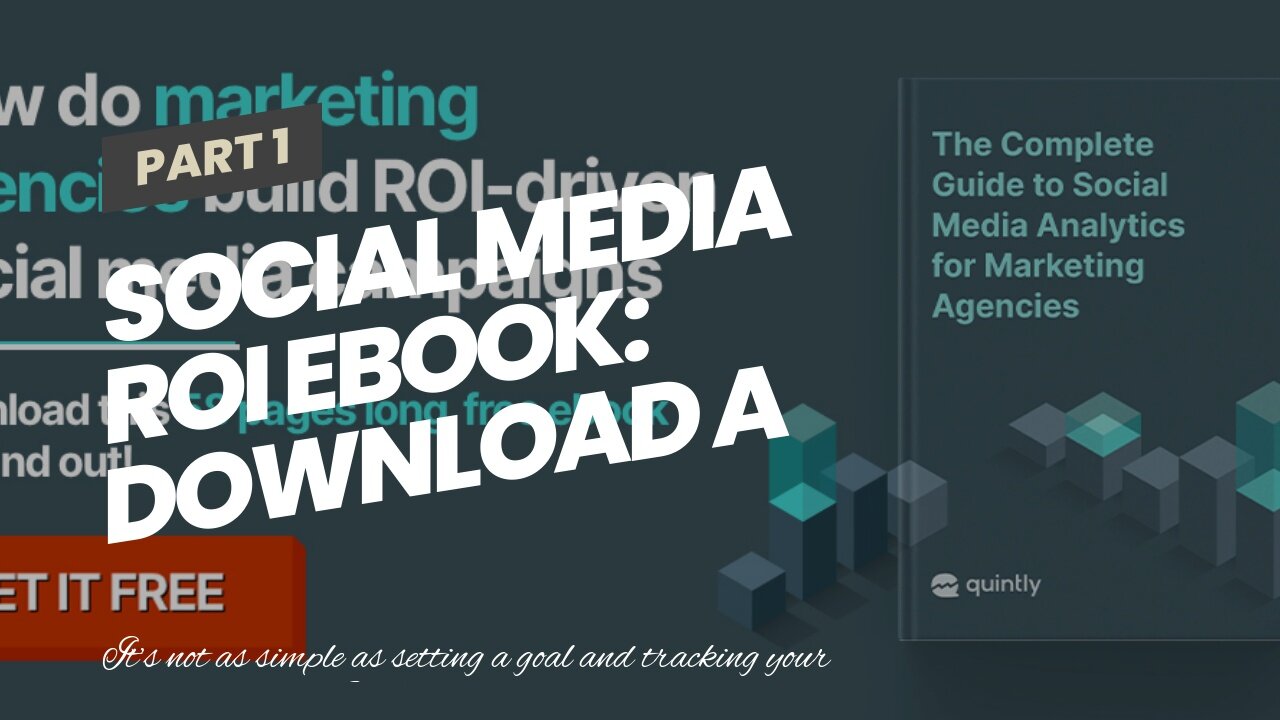Premium Only Content

Social Media ROI ebook: Download a FREE Guide To Proving Social media ROI
Social Media ROI ebook: Download a FREE Guide To Proving Social media ROI
It’s not as simple as setting a goal and tracking your progress with KPIs to track and measure Social Media ROI. According to CEO Emeric Ernoult’s presentation, Agorapulse recently analyzed 10,650,123 social media posts, which exclude Instagram. A link was found in 32% (3393,506) of those posts. Only 1.8% of those posts (64,884) had tracking parameters. This means that 98.2% (or more) of social media posts that could result in revenue or conversions will not be tracked. What is the point of measuring social media ROI so infrequently? It could be a lack of prioritization. Not necessarily. Agorapulse interviewed 300...
It’s not as simple as setting a goal and tracking your progress with KPIs to track and measure Social Media ROI. According to CEO Emeric Ernoult’s presentation, Agorapulse recently analyzed 10,650,123 social media posts, which exclude Instagram. A link was found in 32% (3393,506) of those posts. Only 1.8% of those posts (64,884) had tracking parameters. This means that 98.2% (or more) of social media posts that could result in revenue or conversions will not be tracked. What is the point of measuring social media ROI so infrequently? It could be a lack of prioritization. Not necessarily. Agorapulse interviewed 300 social media professionals to find out about their business impact on social media. While 98% of respondents believe it is important or very important to measure social media’s business impact, only 35% do so. Are CMOs feeling the same? Adverity found that 38% of CMOs consider measuring Social Media ROI their greatest challenge. Marketing Charts reports that 98% of CMOs believe that measuring ROI or ROMI is their biggest challenge. Why? Before you can prove Social Media ROI, there are three major hurdles to overcome: lack of knowledge, lack tools and time constraints. Data is the key to every hurdle. hbspt.forms.create( region: “na1”, portalId: “8477337”, formId: “ea194c64-10aa-42f1-9d2e-17e338508f8e” iOS 14.5 and the deletion of third-party cookies High-profile companies responded to consumer demands for greater privacy, transparency, and control over how and where data was used. Apple has released iOS 14.5, which means all apps must ask users to consent to data collection. Google Chrome plans to end third-party cookie tracking by 2024. This initiative was delayed twice. This is great news for consumers. It’s bad news for social media managers and marketers. Particularly if we are trying to prove and measure Social Media ROI. We won’t be able to track the consumer’s journey through the funnel if we don’t have third-party data. We will not know where consumers are from, how they interact with them, and where they’ve fallen off. Since iOS 14.5 was released, only 10% of iPhone users have shared their data with advertisers. It was previously up to 70% We’ll have a harder time improving our social media ROI if we have less data. How can we tell what’s working and what isn’t? We’ll need to do more to track our progress towards our KPIs, and ultimately our goal. Ratz says that measuring Social Media ROI has been much more difficult since iOS 14.5 was released. “Permissions to disable tracking have been a major problem.” Too many data points at once Despite having our third-party tracking capabilities removed, however, we still have huge amounts of data thanks to advanced technological and analytical tools. Sometimes we are faced with so much data that it can become a frustrating task to find meaningful metrics on social media that will help us track and demonstrate progress towards our KPIs. This is especially true if you collect data from multiple sources and store it in multiple spreadsheets that you manually update. “Suppose you have an Omnichannel presence and you sell products from multiple platforms, websites, or URLs. It can get tricky when you have a lot of data. Data cannot always be trusted Paul Ince, a marketing expert, says that data can be trusty. “Can you trust what you see on Facebook or any other platform?” Sometimes we have trouble articulating the entire situation with data and all its limitations. CMOs are more than one third less likely to trust the data at their disposal. W...
-
 LIVE
LIVE
Dr Disrespect
5 hours ago🔴LIVE - DR DISRESPECT - SOLO TRIPLE THREAT CHALLENGE
13,115 watching -
 LIVE
LIVE
StoneMountain64x
3 hours ago1st stream HERE - PUBG w/ Spartakus (StoneMountain64)
514 watching -
 LIVE
LIVE
Redacted News
2 hours agoBREAKING! NATO PREPARES FOR MASSIVE STRIKES AGAINST RUSSIA, TUCKER CARLSON ARRIVES IN MOSCOW
14,507 watching -
 LIVE
LIVE
Candace Show Podcast
1 hour agoTucker Back In Russia - Is He A TRAITOR?! | Candace Ep 114
8,730 watching -
 LIVE
LIVE
Savanah Hernandez
21 minutes agoSCOTUS hears arguments on child transition surgery as Daniel Penny awaits his fate
46 watching -
 DVR
DVR
In The Litter Box w/ Jewels & Catturd
20 hours agoWe're Back - For Real! | In the Litter Box w/ Jewels & Catturd – Ep. 698 – 12/04/2024
31.7K13 -
 8:59
8:59
IsaacButterfield
13 hours ago $0.18 earnedVegan Booty Sued ($300,000!!)
872 -
 LIVE
LIVE
Barry Cunningham
3 hours agoTRUMP DAILY BRIEFING: Deep State Targets Pete Hegseth! But He WILL Be Confirmed!
1,910 watching -
 1:46:33
1:46:33
Darkhorse Podcast
4 hours agoThe 254th Evolutionary Lens with Bret Weinstein and Heather Heying
20.4K24 -
 1:40:46
1:40:46
The Quartering
4 hours agoCEO Assassinated In NYC, Supreme Court Rules On Trans Issue, South Korea & Pete Hegseth Attacks
62.8K58